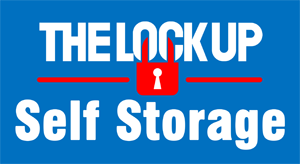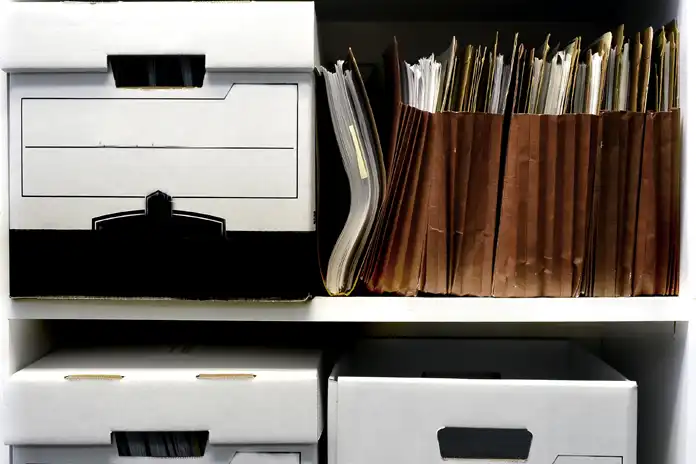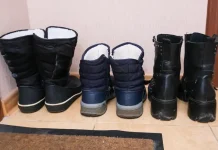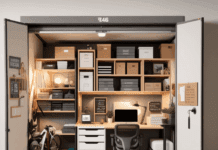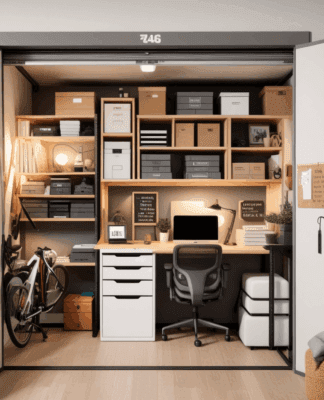How many times have you opened your drawer and placed an important document amidst a stack of unknown papers? Do you have a filing system, or are you one of the millions who rely on a “junk” drawer for your paper graveyard? Regardless of how (or where) your papers are currently being stored, there is a better way. To help you stay organized and ensure your documents are safe for long-term retrieval, we’ve put together a brief guide on how to store your papers.
Preparing Paper Files for Storage
Preparation is key if you want to avoid giving yourself a migraine trying to sort through a stack of unorganized paper materials next time you need something. Here are a few tips to help you prepare important files before jumping into your storage system.
Gather All Your Important Documents
The first step is to gather all of the important documents you have lying around your house. These could be home office documents, tax documents, bills, receipts, or even newspaper clippings that you hold close to your heart. Try to find the original copies of things you’ll want to keep, especially birth certificates or social security cards.
Categorize and Organize
Next, take what you’ve gathered and create two separate piles: personal documents and business-related documents. You’ll further categorize each, but creating a nice work-life balance within your paperwork is a good first step to organizing important documents. Next, further separate things based on what they are. Create a file folder for medical documents or records, personal information, and sentimental items. You should also have a folder for bills and invoices related to work, receipts, confidential office documents, tax information, and any other documents you need to hold onto for legal reasons.
Get Rid of Unnecessary, Outdated, or Irrelevant Items
Once you’ve separated everything into their respective categories, see if there are any duplicates or things you don’t need to hold onto any longer. According to IRS guidance, tax documents should typically be kept for at least even years. Make sure each year is separated within storage boxes. Documents eight years or older may be shredded, but you can also hold onto them just in case.
Remember that anything with personal information or sensitive details should be shredded or burned. You can recycle things like envelopes, junk mail, notes, and other non-personal information.
Keep Pending Documents Easily Accessible
If you have any pending documents in folders, keep them out and make them easily accessible until they’ve been closed. This is recommended for invoices, the current tax year, pending contracts, active contracts, and more. Create a binder or make a filing system that maximizes accessibility for these documents in your home or office.
Choose Your Preferred Storage Method
Organizing your documents properly is the most time-consuming part of the storage process. Once that’s done, you can consider the different storage options. Proper storage varies depending on the type of document and material. For example, sheets of paper are usually more durable than old newspapers or magazines. Some of the best storage containers to choose from include:
Folders Within a Filing Cabinet — This is a traditional filing system that keeps everything in one place within a drawer or two. It works best for active documents but may not be ideal if you have a lot of paper storage needs.
Digital Storage — If you want to go paperless, consider scanning your documents and utilizing a cloud-based storage solution online. When digitally transferring important documents, put aside the originals to be stored in a self-storage unit just in case.
Fireproof Safe — For essential documents like passports, birth certificates, social security cards, or other related documents, consider getting a fireproof safe that can be kept in your home.
Safety Deposit Boxes — Alternatively, you can use a safety deposit box at your local bank.
Climate-Controlled Self-Storage — To keep cardboard boxes or plastic bins filled with paper from piling up in your home, rent a storage unit at your local facility. Just make sure it’s climate-controlled to reduce excessive heat and humidity that can damage paper over time.
Store Your Documents Safely
Once you determine where you will keep your important documents, consider some tips for keeping them in the best condition possible.
Avoid Extreme Temperatures and Humidity
A stack of papers might not seem fragile, but as the years pass, the fibers become more and more sensitive to damage. Depending on where you live, this means that the basement and attic might not be the most ideal place for your paper. Although they’re great for keeping things out of the way, both spaces aren’t as temperature-controlled as the rest of your home. This can cause issues with sensitive or old documents. For proper care and handling, keep paper documents in areas that aren’t subject to extreme temperature changes throughout the year.
The same mentality applies to humidity levels. High moisture in the area can cause paper to yellow, ink to bleed, and deterioration much faster than you’d like. Climate-controlled storage will rectify this issue.
Minimize Light and Water Damage
UV light and water also pose a risk to your paper documents, so it’s important to take measures to prevent these types of damage. Self-storage facilities tend to be dark, and floods are rare, but there is no 100% guarantee that nothing can go wrong. Therefore, try to store boxes with papers on shelves rather than directly on the floor to mitigate the risk even further.
Use Plastic Sleeves for Protection
Another way to take extra precautions when storing your paper documents is to keep them in a protective enclosure. For example, polyethylene or polypropylene sleeves can protect extremely old papers, especially newspaper clippings or archival documents. Polyester films are also widely used. Archivists often use these types of sleeves, which can also be helpful if you have family documents dating back decades or even centuries. However, avoid any sleeves made from polyvinyl chloride (PVC), as this can actually contribute to higher rates of deterioration. If you don’t want to purchase plastic enclosures, you can create a buffer between pages using acid-free and lignin-free paper. Paper that is too acidic can rub against each other and cause issues.
Purchase Acid-Free Filing Boxes
In addition to using acid-free buffers, it’s good practice to find boxes designed specifically for paper storage. These are usually also free of harmful materials like acid and PVC. They’re a great storage material if you want to keep documents without a filing cabinet. Within the boxes, you may want to use some additional kind of organizer to make for easier retrieval. You should label boxes accordingly so you don’t misplace any important papers. This will also help you find what you’re looking for quickly.
Keep Paper Flat, Not Folded or Rolled
Regardless of the type of storage container that you use, make sure that the papers are flat. They can be horizontal or vertical, but avoid keeping things rolled or folded. Folding or rolling documents can cause issues over the years. For example, documents may not unroll without breaking, or the folding could cause them to rip at the crease.
Remove Paper Clips and Staples
Before storing your paper long-term, take the time to remove any paper clips or staples from the stack. Although less important for short-term storage needs, over the years, they can rust. The rust can bleed onto the documents and contribute to deterioration. While it might not be a tragedy for your tax documents, it could cause issues with more sentimental items.
To help you safely store your documents without taking up too much room in your home, consider renting out a self-storage unit from The Lock Up Self Storage. The Lock Up offers temperature-controlled self-storage units in various sizes to supplement your paper storage, regardless of whether it’s for business or pleasure. Our flexible leasing options allow for short-term rentals with the option to extend into long-term solutions. Plus, all our units are climate-controlled with stable humidity levels to keep your documents in great condition, regardless of how long you need to keep them in storage. As an added bonus, our facilities are protected with top-of-the-line security features such as perimeter alarms, gated access codes, and 24/7 CCTV. For more information about our available self-storage units and sizing options, contact us at 1-866-327-LOCK or visit one of our locations for a tour.

